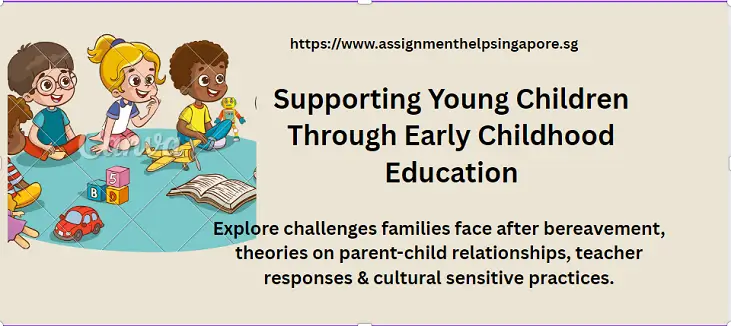
Supporting Young Children Through Grief in Early Childhood Education – Family, School & Culture
Question 1
Five-year-old Jacob has recently lost his father, and his mother has told him, “Daddy has gone to heaven and will not be coming back.” Soon after, the class pet fish dies. When Jacob asks about the fish, the class teacher, Ms. Kat, a novice educator, responds by saying, “He is taking a little break.” When Jacob asks more questions, she says that the fish has gone somewhere else, and she thinks it needed a change of water. When asked if the fish will come back, she dismisses his concerns. Jacob becomes visibly anxious and begins to withdraw from his classmates.
a. Provide a brief synthesis of literature (no more than eight relevant sources, including newspaper articles) that explains TWO (2) challenges young families experience when facing unpredictable stressors, with a particular focus on the death of a family member. At the end of your answer, include a table listing all the sources you referred to, formatted according to APA 7th edition citation style.
(20 marks)
b. With reference to (a), use ONE (1) theory we have discussed in the course to examine how grief can impact the parent-child relationship and the collaboration between home and preschool. Include TWO (2) examples that clearly illustrate how the theory applies in this context. Draw on your course readings and your professional experiences to strengthen your argument.
(20 marks)
c. Analyse Ms. Kat’s response in the scenario and discuss TWO (2) potential implications it may have on Jacob’s grieving process, drawing on the readings below and other relevant course materials.
- Schonfeld, D. S. (2021). How early childhood educators can explain death to children. Teaching Young Children, 14 (3). https://www.naeyc.org/resources/pubs/tyc/spring2021/explaining-death
- Olin, T., & Wilcox-Herzog, A. (2020). Discussing death with young children. https://www.zerotothree.org/resource/discussing-death-with-young-children.
(20 marks)
d. Present a detailed description of how you might respond to Jacob, incorporating both verbal and non-verbal interactions. Provide TWO (2) examples from your response to illustrate how your approach demonstrates cultural sensitivity, drawing on concepts discussed in the course readings.
(10 marks)
e. Illustrate TWO (2) culturally appropriate family centred collaborative practices that Ms. Kat can use to help Jacob, and his mother navigate their grief. For each of the suggested practices, include a clear rationale based on your course readings and the AECES Code of Ethics for Early Childhood Professionals (3rd edition)
(20 marks)
Childhood Assignment Answers: Experts Answer on Above Childhood Learning Questions
Challenges for families facing death
The two most common challenges are emotional and psychological strain, and communication challenges. The emotional and psychological strain can be identified in the form of struggle with sadness, anxiety and disruption in the day to day practices. Communication challenges are because of feeling an awkward situation while communicating with young people about the death.
Application of the theory
Theory that is most relevant in the given case is attachment theory. The loss of life has a deeper impact on a child’s sense of security, as the child may feel less supported. In the given scenario, Jacob’s sense of stability can be enhanced through strong pre School collaboration.
Analysis of Kat’s response
The response leads to confusion and mistrust, as Jacob may confuse death and it would further lead to anxiety. Children often require an honest response, else it would result in the risk of emotional withdrawal.
Appropriate response to Jacob
The most appropriate response to Jacob would be to use simple and honest language such as the fish diet and it will not come back again. From a cultural point of view, it is important to acknowledge the death in a responsible way and allow Jacob to express grief.
| Disclaimer: This answer is a model for study and reference purposes only. Please do not submit it as your own work. |




